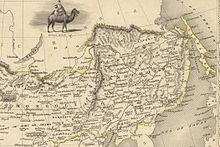Oroch people
- View a machine-translated version of the Russian article.
- Machine translation, like DeepL or Google Translate, is a useful starting point for translations, but translators must revise errors as necessary and confirm that the translation is accurate, rather than simply copy-pasting machine-translated text into the English Wikipedia.
- Consider adding a topic to this template: there are already 918 articles in the main category, and specifying
|topic=will aid in categorization. - Do not translate text that appears unreliable or low-quality. If possible, verify the text with references provided in the foreign-language article.
- You must provide copyright attribution in the edit summary accompanying your translation by providing an interlanguage link to the source of your translation. A model attribution edit summary is
Content in this edit is translated from the existing Russian Wikipedia article at [[:ru:Орочи]]; see its history for attribution. - You may also add the template
{{Translated|ru|Орочи}}to the talk page. - For more guidance, see Wikipedia:Translation.
Нани | |
|---|---|
 Oroch people (circa 1920) | |
| Total population | |
| c. 1,000 (est.) | |
| Regions with significant populations | |
 Russia: Russia:
| 527[1] |
 Ukraine Ukraine | 288 (2001) |
| Languages | |
| Oroch language, Russian | |
| Religion | |
| Shamanism, Russian Orthodoxy, Buddhism | |
| Related ethnic groups | |
| Evens, Evenks, Ulchs, Nanai, Orok, Udege | |

| History of the Priamurye region |
|---|
| also including Heilongjiang, Amur Oblast and southern part of Khabarovsk Krai |
|
|
Orochs (Russian О́рочи), Orochons, or Orochis (self-designation: Nani) are a people of Russia that speak the Oroch (Orochon) language of the Southern group of Tungusic languages. According to the 2002 census there were 686 Orochs in Russia. According to the 2010 census there were 596 Orochs in Russia.
Orochs traditionally settled in the southern part of the Khabarovsk Krai, Russia and on the Amur and Kopp rivers. In the 19th century, some of them migrated to Sakhalin. In the early 1930s, the Orochi National District was created, but was cancelled shortly thereafter "due to lack of native population".
Because the people never had a written language, they were educated in Russian. Their language, Oroch, is on the verge of extinction; According to the 2021 census there are only about 43 native speakers of the language. on They follow Shamanism, the Russian Orthodox Church, and Buddhism.
History
Between 1963 and 1993, major changes took place in Oroch families:
- Almost all Orochi marriages became inter-ethnic - in 1951-1955, 73% of Orochi marriages were mono-ethnic, and in 1991-1995 only 9%.[2]
- The share of Oroch-Russian marriages increased sharply from 9% in 1951-1955 to 82% in 1991-1995.[2]
- The maximum size of an Oroch family decreased from 10 to 7 people from 1963 to 1993.[2]
- The average family size of the Orochi in 1993 was 2.9 people, compared to 4.8 in 1963.[2]

References
- ^ "Russian Census 2021: Population by ethnicity" (in Russian).
- ^ a b c d "Историческая Демография" [Historical Demography] (PDF). Научный журнал (in Russian). 1 (5). 2010.
External links
 Media related to Oroch people at Wikimedia Commons
Media related to Oroch people at Wikimedia Commons- The Orochis in The Red Book of the Peoples of the Russian Empire
- Ethnologue link
This article about Russian culture is a stub. You can help Wikipedia by expanding it. |
- v
- t
- e
 | This article about an ethnic group in Asia is a stub. You can help Wikipedia by expanding it. |
- v
- t
- e
















